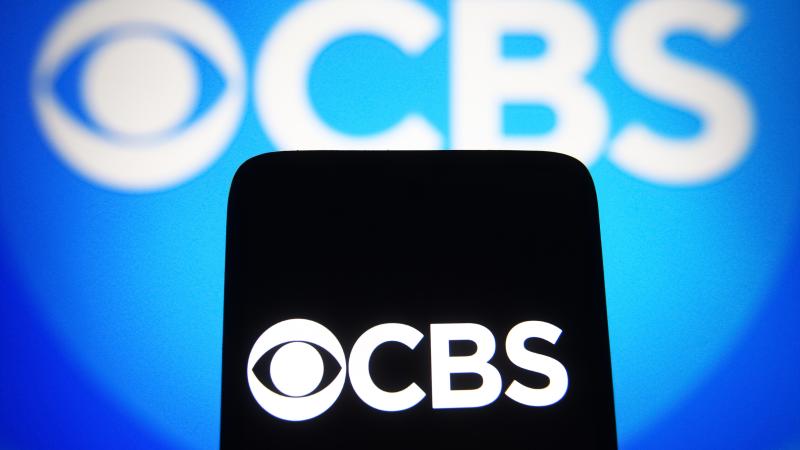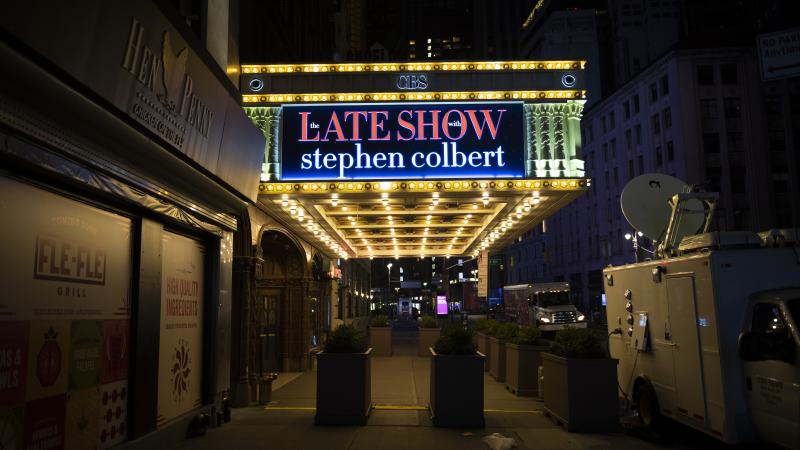Media credits Biden for ISIS leader's death, after blasting Trump for similar terrorist killings
Trump was accused of stoking tensions, being "un-American" in sharp contrast to Biden press coverage.
The mainstream media is crediting President Biden for directing the U.S. raid that killed the leader of Islamic State (ISIS) on Wednesday night, in sharp contrast to how the press panned then-President Trump after he ordered operations to kill the leaders of two U.S.-designated terrorist organizations in 2019 and 2020.
"Last night at my direction, U.S. military forces in northwest Syria successfully undertook a counterterrorism operation to protect the American people and our allies, and to make the world a safer place," Biden said Thursday. "Thanks to the skill and bravery of our armed forces, we have taken off the battlefield Abu Ibrahim al Hashimi al Qurayshi, the leader of ISIS."
All Americans returned safely from the operation, Biden said.
Biden later described how, during the operation, al Qurayshi detonated a suicide bomb "in a final act of desperate cowardice." The explosion killed al Qurayshi as well as his wife and two children, according to Pentagon spokesman John Kirby.
A senior deputy of al Qurayshi and his wife were also killed in the raid, as was a child, said Kirby, who added U.S. forces safely evacuated 10 people from the building, including eight children.
The White Helmets, a local rescue service, said it found at least 13 bodies, including six children and four women, who were killed "in the clashes and bombing that followed the airborne operation."
Virtually all mainstream media outlets reported on the operation, al Qurayshi's death, and Biden's comments on Thursday. The coverage was largely neutral, with networks, news sites, and newspapers reporting what happened and crediting Biden for ordering and overseeing the raid.
Some journalists noted the ISIS strike could be a boon for Biden's presidency, which has been struggling with low approval ratings — in part due to Biden's decision to withdraw all U.S. troops from Afghanistan last year. With the Taliban in power, analysts fear Afghanistan will again become a hub for Islamist terrorism, as it was before 9/11.
Just the News didn't find examples of prominent, mainstream outlets criticizing Biden's conduct before, during, or after the operation. Nor did Just the News find journalists at these outlets questioning Biden's judgment or warning of the consequences of his decision to OK the raid.
In sharp contrast, the nation's most prominent media outlets lambasted President Trump for his conduct and judgment when he ordered a similar operation in Syria in October 2019 that killed al Qurayshi's predecessor, Abu Bakr al Baghdadi. Outlets also downplayed and questioned Trump's decision to approve the raid, in many cases seemingly trying to avoid giving him credit.
On the day Trump announced al Baghdadi's death, NBC correspondent Hallie Jackson said the raid came "at a time when critics have really raised questions about [Trump's] policy [to withdraw forces from] Syria." Others on air echoed Jackson's sentiment.
Biden, like Trump, has sought to maintain less of a military presence in the Middle East, although reporters haven't questioned the former's policy toward Syria or the broader region following Wednesday night's operation.
Some journalists questioned whether killing al Baghdadi was even good for Trump.
"The president has really been under tough scrutiny — the impeachment inquiry, members of his own party criticizing him for his decision in Syria. Is this a big victory for the president?" ABC anchor Eva Pilgrim asked network correspondent Terry Moran, who appeared to downplay the event as routine.
"It is a big victory for the president," said Moran. "It's also the kind of thing that Americans expect presidents to accomplish ... This is the kind of presidential leadership that people do expect."
That same day, MSNBC guest host Yasmin Vossoughian asked MSNBC military analyst Jack Jacobs whether Trump's operation would actually strengthen ISIS.
"I wonder here if this type of killing only reinforces the ideology of Baghdadi's followers and in fact strengthens it?" she asked.
"Well, it doesn't make it any easier for those of us who want to destroy the organization completely," Jacobs responded.
Meanwhile, CNN host Jake Tapper expressed concern on air that Trump was too transparent about the operation in his remarks to the public.
"Were you concerned at all, listening to that, whether he was giving too much information?" Tapper asked a panel. "I mean, I'm a journalist, I want it all, but I saw some grimaces around this table."
Tapper also claimed Trump didn't thank then-CIA Director Gina Haspel and then-Director of National Intelligence Joe Maguire for their roles and said the president was "bending over backward to thank [Russian President Vladimir] Putin for allowing the U.S. to use its airspace for the operation."
In his remarks, Trump thanked "the great intelligence professionals who helped make this very successful journey possible," as well as Russia, among other nations, for playing a role.
Several journalists noted that Trump thanked Russia, in an apparent nod to the now-debunked allegations that Trump's campaign colluded with the Russian government to win the 2016 presidential election.
The same day, John Harwood, then at CNBC, expressed concern over Trump not informing House Speaker Nancy Pelosi (D-Calif.), who had served on the House Intelligence Committee, about the Baghdadi operation ahead of time. He wasn't alone.
"The other big story this morning, Democratic leaders demanding answers about why they weren't notified when President Trump ordered the raid that killed ISIS leader Abu Bakr al Baghdadi," said MSNBC's Chris Jansing.
Just the News reached out to Pelosi, the White House, and the House Intelligence Committee asking if Biden had informed anyone in Congress about Wednesday night's raid before it happened. The first two haven't responded, but a House Intelligence Committee official told Just the News it was not warned ahead of time.
"The committee was not notified prior to the mission, and will ask for additional information from the administration on that decision," the official said.
Reporters who criticized Trump for not informing Congress about the Baghdadi strike don't appear to have stressed the issue this time with Biden.
Jansing also said after the 2019 operation, "The raid that killed al Baghdadi is both a military and political victory for the Trump administration, but some officials point out that it may say as much about the flaws in Trump's foreign policy as it does about how well it can work."
She then referenced a New York Times report saying military commanders rushed the timing of the raid while U.S. forces were still on the ground. "So do you agree with intelligence and counterterrorism officials who are cited by the Times as saying this raid occurred largely in spite of President Trump's actions, not because of them?" Jansing asked a guest.
Media outlets such as CNN and MSNBC also criticized Trump's remarks on the raid, in which he said al Baghdadi died "like a dog" and was a "sick and depraved man," as being "shocking" and "un-American." MSNBC's Joe Scarborough said Trump "sounded like Saddam Hussein after torturing people."
All the above press coverage occurred within 24 hours of news breaking that al Baghdadi was dead.
Much of the press responded in a similar way in January 2020, when Trump ordered an operation that killed Iranian Gen. Qassem Soleimani, who many experts believe was the second most powerful Iranian official behind Supreme Leader Ali Khamenei.
Soleimani was sanctioned by the U.S. Treasury Department and headed the Quds Force of Iran's Islamic Revolutionary Guard Corps (IRGC.) In that role, he was responsible for the deaths of hundreds of U.S. soldiers in Iraq, according to the Pentagon. The U.S. has designated both the Quds Force and the IRGC as terrorist organizations.
Shortly after Soleimani's death, mainstream media outlets, such as NBC and NPR, questioned whether the U.S. strike was legal, portraying Trump's decision as a potentially illegal act of belligerence. CNN's John Berman referred to "the murder, the assassination of General Soleimani," adding it occurred as Trump was facing impeachment proceedings.
Many media outlets reported on the prospect that Trump timed the military strike to distract from his expected impeachment trial.
Democrats "pressed questions about the attack's timing and whether it was meant to deflect attention from the president's expected impeachment trial this month in the Senate," the New York Times reported. "They said he risked suspicion that he was taking action overseas to distract from his political troubles at home, as in the political movie 'Wag the Dog.'"
NBC correspondent Harry Smith similarly noted two days after Soleimani's death, "Impeachment, no one's talked about impeachment, what, for two or three days now."
"This issue of Iran is overshadowing impeachment," host Chuck Todd agreed.
In the wake of al Qurayshi's death, it appears no journalists at the same outlets have suggested Biden's raid was meant to distract from his historically low poll numbers.
Regarding potential legal problems with the Soleimani strike, publications noted that the U.S. didn't have a status of forces agreement (SOFA) authorizing the presence of U.S. troops in Iraq, where Soleimani was killed, at the time of the strike. Talks to negotiate a SOFA with Iraq failed when President Obama was in office and Biden served as vice president. The Obama administration ultimately opted to withdraw U.S. forces from Iraq in 2011, a decision that, analysts say, allowed ISIS to take root.
Several journalists said the Soleimani military strike would stoke tensions between the U.S. and Iran and potentially lead to war.
CNN correspondent Arwa Damon characterized the operation as "fairly brazen, fairly audacious to a certain degree, to be taking out someone of such significance at a time when there is such tension in the region."
"It's not clear what the objective is here," commentator Fareed Zakaria added. "Soleimani is a bad guy. There's no question, but we appear to be without, by the way, I'd say without congressional authorization, entering into another Middle East war."
"There are fears that the killing of Soleimani, a revered figure in Iran and some other places in the Middle East, could see simmering tensions between the U.S. and Iran turn explosive," reported CBS's Holly Williams.
"Iran vowing retaliation amid fears the two nations are on the brink of an all-out war," said NBC's Hoda Kotb. "Oil prices already skyrocketing." Network anchor Lester Holt asked hours later whether it's "a more dangerous world" after Soleimani's death.
Amid concerns that Trump was risking conflict with Iran, CNN reported that Trump was eating meatloaf and ice cream at his Mar-a-Lago club as news broke of the Soleimani strike. Other outlets, including Business Insider, similarly reported on the president's meal at the time. The stories depicted Trump as not being engaged at the time of the operation.















